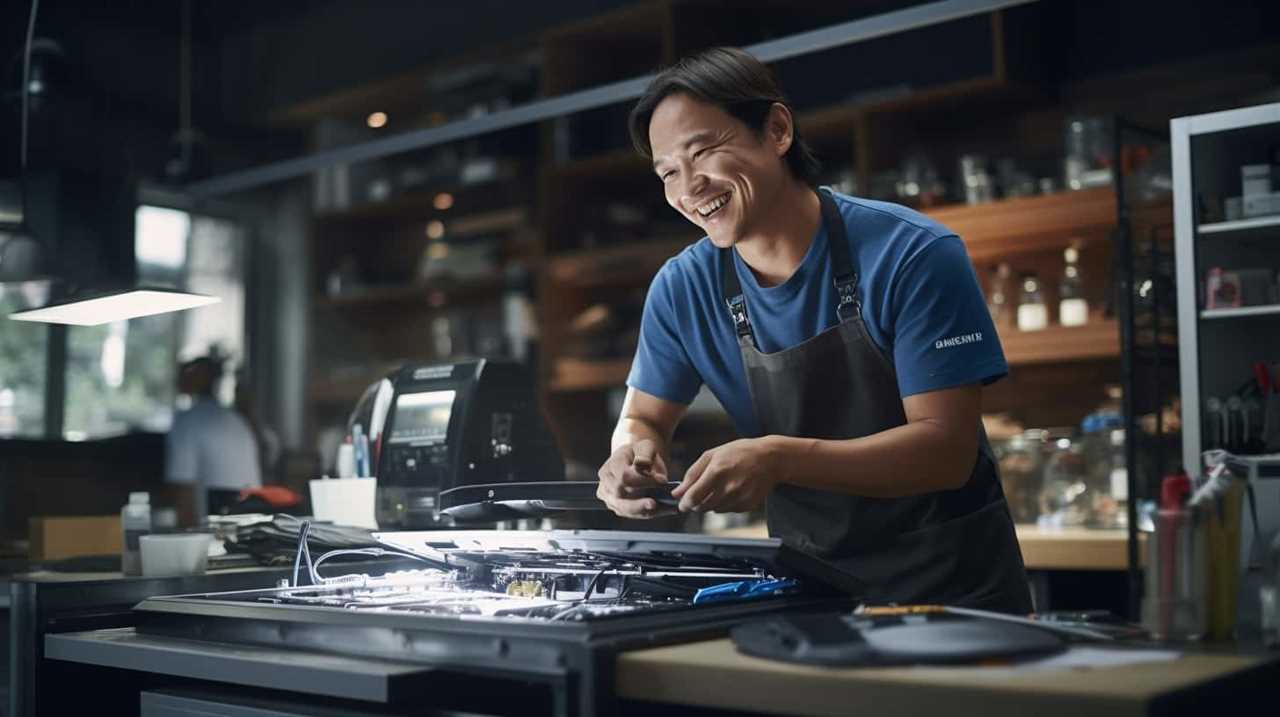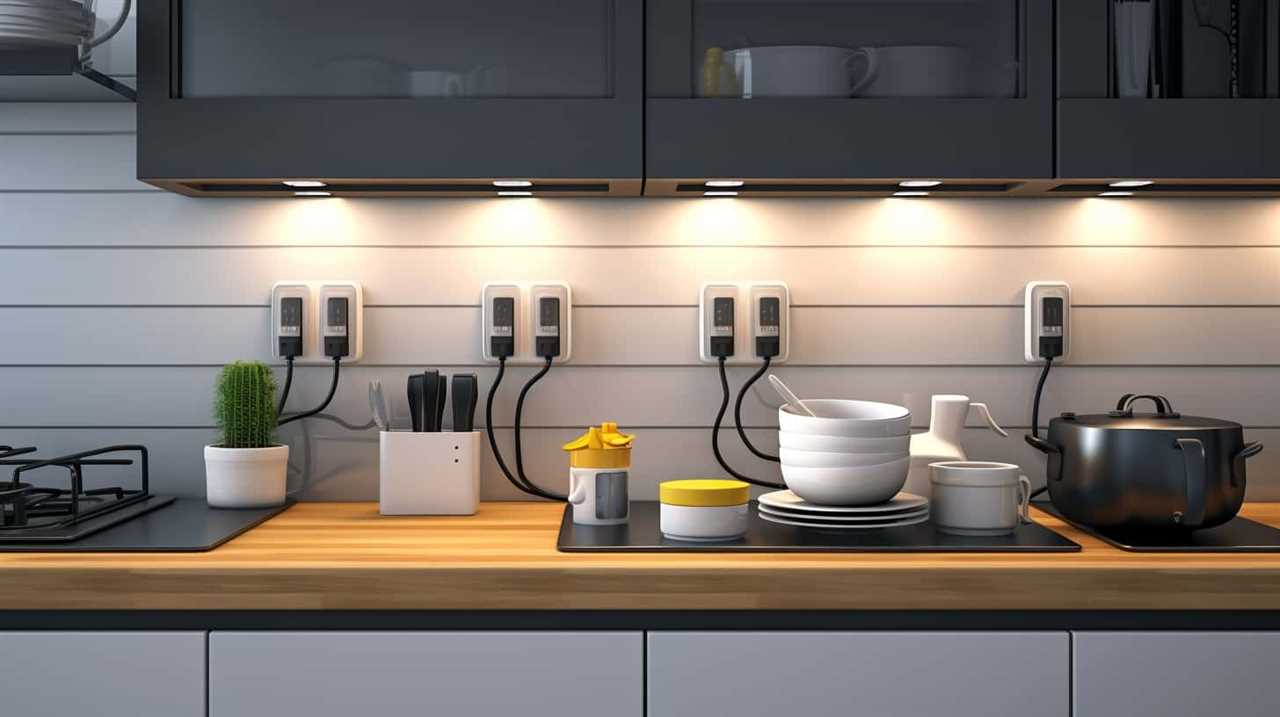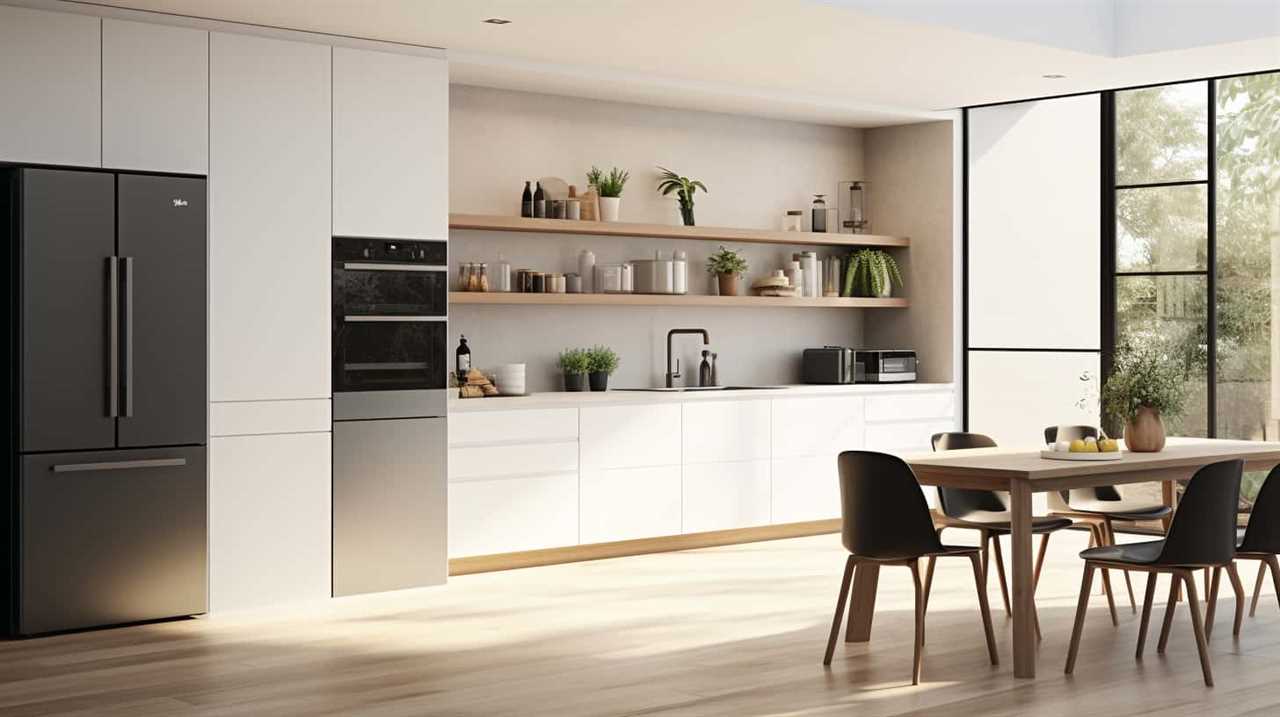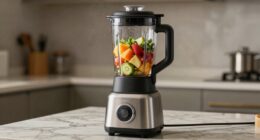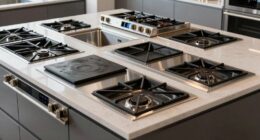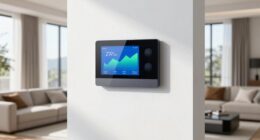Welcome to our in-depth guide on appliance safety inspections for landlords.
As property owners, it is vital that we prioritize the well-being of our tenants by ensuring their appliances are safe and functional.
Picture this: a home filled with appliances that are not only efficient but also free from potential hazards.
Our guide will equip you with the knowledge and skills to conduct regular inspections, identify potential dangers, and implement necessary safety measures.

From electrical safety checks to inspecting heating elements and cords, we cover it all.
By following our recommendations, you can create a safe and secure living environment for your tenants, promoting peace of mind and a sense of mastery over appliance safety.
Key Takeaways
- Familiarize yourself with specific regulations in your jurisdiction
- Regular appliance inspections prevent potential hazards and ensure tenant safety
- Regular maintenance extends the lifespan of appliances and saves money in the long run
- Conduct electrical safety checks during inspections and address issues promptly.
Understanding Appliance Safety Regulations
When conducting appliance safety checks, we must familiarize ourselves with the current regulations in order to ensure compliance and protect our tenants. Understanding appliance safety regulations is crucial for landlords who want to maintain a safe living environment for their tenants. Compliance challenges can arise when it comes to staying up-to-date with the ever-evolving regulations.
To begin, it’s essential to have a thorough understanding of the specific regulations that apply to your jurisdiction. These regulations may vary depending on the type of appliance, such as gas or electrical, and the specific safety standards set forth by your local authorities. Keeping track of any updates or changes to these regulations is vital to ensure that your properties remain compliant.

Compliance challenges can arise due to the complexity of the regulations and the need for regular inspections and maintenance. It’s important to have a system in place that keeps track of inspection dates and ensures that all necessary repairs or replacements are promptly addressed. By staying proactive and organized, landlords can overcome these challenges and prioritize the safety of their tenants.
Importance of Regular Appliance Inspections
Regular appliance inspections play a crucial role in preventing potential hazards and ensuring the safety of tenants. By conducting these inspections, landlords can identify any issues or malfunctions in appliances before they become serious problems, reducing the risk of accidents or property damage.
Additionally, regular inspections help landlords comply with safety regulations and demonstrate their commitment to maintaining a safe living environment for their tenants.
Preventing Potential Hazards
As landlords, we prioritize the safety of our tenants by conducting regular appliance inspections to prevent potential hazards. Preventing accidents is crucial in ensuring the well-being of our tenants and protecting our property.

Regular appliance maintenance plays a significant role in reducing the risk of accidents caused by faulty appliances. By inspecting appliances regularly, we can identify any potential issues such as frayed cords, leaks, or malfunctioning parts. These inspections allow us to take proactive measures to address these problems before they become serious hazards.
Additionally, regular inspections help to extend the lifespan of appliances, saving us money in the long run. By investing time and effort in conducting thorough inspections, we demonstrate our commitment to providing a safe and secure living environment for our tenants.
Ensuring Tenant Safety
To ensure tenant safety, we conduct regular appliance inspections using a thorough checklist. As landlords, it’s our responsibility to prioritize the well-being of our tenants and educate them about potential hazards. Regular inspections not only help identify any existing issues with appliances but also prevent future accidents.
Here are four reasons why regular appliance inspections are crucial for tenant safety:

- Identifying faulty wiring or electrical issues that could lead to fires or electric shocks.
- Checking for gas leaks or carbon monoxide leaks to prevent potential poisoning.
- Ensuring proper ventilation in kitchen areas to prevent the buildup of harmful gases.
- Verifying the functionality of safety features such as smoke detectors and fire extinguishers.
Identifying Potential Hazards in Appliances
We regularly inspect appliances in our rental properties to actively identify any potential hazards. As responsible landlords, it’s our duty to ensure the safety of our tenants by adhering to appliance safety guidelines. By conducting regular inspections, we can identify and address potential hazards before they become a safety concern.
During our inspections, we look for various potential appliance hazards. One common hazard is faulty wiring, which can lead to electrical malfunctions and even fires. We carefully examine the power cords, plugs, and outlets for any signs of damage or wear. Additionally, we check for loose connections and frayed wires that could pose a risk to both the tenants and the property.
Another potential hazard is improper ventilation in appliances such as dryers, water heaters, and furnaces. Poor ventilation can lead to a buildup of harmful gases, such as carbon monoxide, which can be extremely dangerous if not detected early. We ensure that all vents and exhaust systems are clean and functioning properly to prevent any potential health risks.
Lastly, we pay close attention to any signs of wear and tear on appliances. Components such as seals, gaskets, and valves can deteriorate over time, leading to leaks and other safety issues. By promptly addressing these issues, we can prevent potential hazards from escalating into more significant problems.

Conducting Electrical Safety Checks
During our regular inspections, we assess the electrical safety of appliances by checking for potential hazards and addressing any issues promptly. Understanding electrical regulations is crucial for landlords to ensure the safety of their tenants and avoid legal liabilities.
Here are some common electrical hazards to look out for:
- Faulty Wiring: Inspect the electrical wiring for any signs of wear and tear, such as frayed or exposed wires. Faulty wiring can lead to electrical shocks or fires.
- Overloaded Circuits: Check if the appliances are plugged into overloaded circuits. Overloading can cause circuit breakers to trip or even start a fire.
- Lack of Grounding: Ensure that all appliances have proper grounding to prevent electrical shocks. Grounding provides a path for electrical current to flow safely into the ground.
- Inadequate Insulation: Inspect the insulation around wires to ensure it’s intact and not damaged. Damaged insulation can increase the risk of electrical fires.
By conducting regular electrical safety checks and addressing any issues promptly, landlords can ensure the safety of their tenants and comply with electrical regulations.
In the next section, we’ll discuss the importance of ensuring proper ventilation for appliances.

Ensuring Proper Ventilation for Appliances
Moving on to ventilation, it’s important for us to ensure that appliances have proper airflow to prevent overheating and potential hazards. Proper maintenance of appliance ventilation is crucial to ensure the safe and efficient operation of our appliances.
Firstly, it’s essential to regularly clean the vents and filters of appliances such as refrigerators, dryers, and air conditioners. Dust and debris can accumulate over time, obstructing airflow and causing the appliance to work harder, which may lead to overheating. By cleaning the vents and filters, we can maintain proper airflow and prevent potential fire hazards.
Additionally, it’s important to check for any obstructions around the appliance. Make sure that the appliance has sufficient space around it for air to circulate freely. Placing appliances in cramped spaces or near flammable materials can impede airflow and increase the risk of overheating and fire.
Lastly, consider installing ventilation fans or vents in areas where appliances generate heat, such as kitchens or laundry rooms. These fans and vents can help remove excess heat and moisture, preventing the buildup of condensation and reducing the risk of mold growth.

Checking for Gas Leaks in Appliances
To ensure the safety of our tenants, it’s crucial for landlords to regularly check for gas leaks in appliances. Gas leaks can be dangerous and pose serious risks to both the property and the people living in it.
Here are some important steps to follow when checking for gas leaks:
- Inspect the appliances: Regularly inspect all gas appliances in the property, such as stoves, water heaters, and furnaces. Look for any signs of wear and tear, loose connections, or damaged hoses.
- Use a gas detector: Invest in a gas detector or alarm system that can detect the presence of gas leaks. Place these detectors near gas appliances and ensure they’re regularly tested and maintained.
- Check for unusual odors: Gas leaks are often accompanied by a distinct rotten egg smell. If you notice this odor or any other unusual smells near your gas appliances, it could be a sign of a gas leak. Take immediate action and contact a professional for assistance.
- Listen for strange noises: Unusual hissing or whistling sounds near gas appliances could indicate a gas leak. If you hear any of these noises, turn off the gas supply and seek professional help.
By regularly checking for gas leaks in appliances and taking appropriate actions, landlords can prevent potential disasters and ensure the safety of their tenants.
In the next section, we’ll discuss the importance of testing and maintaining appliance heating elements.

Testing and Maintaining Appliance Heating Elements
Regular maintenance and inspection of appliance heating elements is essential to ensure their proper functioning and prevent potential safety hazards. Heating elements can deteriorate over time due to wear and tear, which can lead to inefficient heating or even complete failure. To maintain the longevity and efficiency of heating elements, landlords should perform regular maintenance checks and troubleshoot any issues that may arise.
One important aspect of heating element maintenance is cleaning. Over time, heating elements can accumulate dirt, grease, and other debris, which can hinder their performance. Regular cleaning with a soft brush or cloth can help remove these contaminants and ensure optimal heating.
In addition to cleaning, landlords should also check for any signs of damage or wear. Cracks, breaks, or loose connections can affect the performance and safety of heating elements. If any damage is found, it’s crucial to replace the heating element immediately to prevent further issues.
Testing the heating element’s functionality is another crucial step in maintenance. Landlords should use a multimeter to check for continuity and proper resistance. If the heating element fails these tests, it should be replaced promptly.

Inspecting Appliance Cords and Plugs
When inspecting appliance cords and plugs, we check for any signs of damage or wear. It’s essential to ensure that the cords and plugs are in good condition to prevent electrical hazards and accidents. Here are some key points to consider when inspecting appliance cords and plugs:
- Look for frayed or exposed wires: Inspect the entire length of the cord to identify any frayed or exposed wires. These can pose a significant risk of electrical shock and should be addressed immediately.
- Check for loose or damaged plugs: Examine the plugs for any signs of looseness or damage. Loose plugs can cause intermittent power supply, while damaged plugs can lead to sparks or short circuits.
- Verify proper grounding: Confirm that the plugs have proper grounding prongs. This is crucial for appliances that require grounding to minimize the risk of electric shock.
- Ensure proper cord placement: Make sure that the cords aren’t pinched or crushed by heavy furniture or appliances. Pinched cords can cause damage to the insulation, leading to electrical hazards.
Checking for Water Leaks in Appliances
Now let’s turn our attention to the crucial task of checking for water leaks in appliances. As landlords, it’s our responsibility to prevent water damage in our rental properties.
By regularly inspecting appliances for leaks, we can detect any issues early on and take the necessary maintenance steps to avoid costly repairs down the line.
Proper maintenance is key to keeping our appliances functioning efficiently and preventing potential water damage in our rental units.

Preventing Water Damage
To prevent water damage, we must regularly check appliances for any water leaks. Water leaks can cause significant damage to our properties and can lead to costly repairs. Here are some important steps to consider for water damage prevention and water leak detection:
- Inspect the water supply hoses of appliances such as washing machines, dishwashers, and refrigerators. Look for any signs of wear, cracks, or leaks.
- Check the connections and seals of appliances that use water, such as faucets and toilets. Make sure they’re tightly secured and not leaking.
- Monitor the water pressure in your property. High water pressure can put stress on appliances and increase the risk of leaks.
- Install water leak detection devices or smart water meters that can alert you to any abnormal water usage or leaks.
Early Leak Detection
Our first priority is to ensure the safety of our properties by conducting regular checks for water leaks in appliances. Early leak detection is crucial in preventing extensive damage and costly repairs. By implementing a proactive approach to appliance maintenance, we can minimize the risk of water leaks and potential property damage.
To assist you in identifying and addressing water leaks in appliances, we have created a helpful table outlining the key areas to inspect and potential signs of leaks:
| Appliance | Key Areas to Inspect | Signs of Leaks |
|---|---|---|
| Washing Machine | Hoses, connections | Dampness or pooling water near the machine, musty odor |
| Dishwasher | Supply and drain lines | Water stains or wetness around the dishwasher, mold growth |
| Refrigerator | Ice maker, water line | Puddles or water droplets near the refrigerator, water dispenser issues |
| Water Heater | Pressure relief valve, tank | Corrosion, dripping water, water temperature inconsistencies |
Regularly checking these areas and promptly addressing any signs of leaks will help maintain the integrity of your appliances and prevent water damage. Remember to consult appliance manuals or seek professional assistance when needed.

Importance of Maintenance
Regular maintenance is essential to ensure the safety and functionality of our appliances, particularly when it comes to checking for water leaks. Here are some key reasons why regular maintenance and appliance safety checks should be a priority for landlords:
- Prevent property damage: Regular maintenance allows us to identify and address water leaks before they cause significant damage to the property.
- Minimize repair costs: By catching water leaks early on, we can prevent them from escalating into costly repairs or replacements.
- Ensure tenant safety: Water leaks can lead to electrical hazards and mold growth, posing risks to the health and safety of tenants. Regular maintenance helps mitigate these risks.
- Extend appliance lifespan: By promptly addressing water leaks, we can prolong the life of our appliances, saving money in the long run.
Implementing Appliance Safety Policies for Tenants
We prioritize the implementation of clear and comprehensive appliance safety policies for our tenants. Effective tenant communication is essential in ensuring that they understand their responsibilities and our legal obligations as landlords. By providing them with detailed guidelines and instructions regarding the safe use and maintenance of appliances in their rental units, we can minimize the risk of accidents, property damage, and potential legal issues.
Our appliance safety policies outline the tenant’s obligations to report any appliance malfunctions, damages, or safety concerns promptly. We emphasize the importance of regular inspections and maintenance to ensure the proper functioning of appliances. We also provide information on how to safely operate each appliance, including guidelines on cleaning, handling, and troubleshooting common issues.
In implementing these policies, we strive to create a safe living environment for our tenants while fulfilling our legal obligations as landlords. We make sure to regularly review and update our policies to stay up-to-date with the latest safety standards and regulations. Additionally, we encourage open communication with our tenants, welcoming their feedback and addressing any concerns they may have promptly.

Frequently Asked Questions
Are Landlords Legally Required to Conduct Regular Appliance Safety Inspections?
Regular appliance safety inspections aren’t legally required for landlords, but they’re of utmost importance. Proper maintenance and inspections can prevent potential hazards and ensure the safety of tenants.
Professional safety inspections offer numerous benefits, such as identifying faulty appliances, reducing the risk of accidents, and increasing the lifespan of appliances.
How Often Should Landlords Schedule Appliance Safety Inspections?
When it comes to landlords’ responsibilities, appliance maintenance is a crucial aspect.
Regular safety inspections are essential to ensure the well-being of tenants and the proper functioning of appliances.

Scheduling these inspections should be done in a timely manner to address any potential hazards or malfunctions.
What Are Some Common Signs of Potential Hazards in Appliances?
When it comes to appliance maintenance, regular inspections are crucial. As landlords, we must be aware of common signs of potential hazards in appliances. These signs include strange noises, unusual smells, and appliances not functioning properly. By identifying these warning signs early on, we can prevent accidents and ensure the safety of our tenants.
That’s why it’s important to conduct regular inspections and address any issues promptly. Regular maintenance and inspections are key to keeping appliances in good working condition and avoiding potential hazards.
Can Landlords Perform Electrical Safety Checks Themselves or Should They Hire a Professional?
When it comes to electrical safety checks, landlords may wonder whether to handle it themselves or hire a professional. Weighing the pros and cons of DIY versus professional inspections is crucial.

While DIY inspections can save costs, they may lack the expertise and thoroughness of a professional. On the other hand, professional inspections offer peace of mind and ensure compliance with safety regulations.
Landlords should also consider cost-effective alternatives, such as enrolling in training courses to enhance their skills.
Ultimately, prioritizing safety is paramount in maintaining a secure living environment for tenants.
What Steps Can Landlords Take to Ensure Proper Ventilation for Appliances in Rental Properties?
To ensure proper ventilation for appliances in rental properties, landlords must follow ventilation requirements and prioritize regular maintenance.

Adequate ventilation is crucial to prevent the buildup of harmful gases, such as carbon monoxide, and to maintain optimal appliance performance.
Regular maintenance includes cleaning vents and filters, checking for obstructions, and ensuring proper airflow.
What Should Landlords Include in Their Appliance Safety Checks to Meet Safety Standards and Regulations?
When conducting appliance safety checks, landlords should ensure compliance with appliance safety standards regulations. This includes testing electrical wiring, checking for gas leaks, and ensuring proper ventilation for appliances. Regular maintenance and inspections can help prevent accidents and meet safety standards and regulations.
Conclusion
In conclusion, regular appliance safety checks are crucial for landlords to ensure the well-being of their tenants.
While some may argue that these inspections are time-consuming and unnecessary, it’s important to remember that the safety of our tenants should always be our top priority.

By conducting these checks, we can prevent potential hazards, such as electrical malfunctions or water leaks, and provide a safe living environment for our tenants.
Let’s prioritize their safety and peace of mind.
